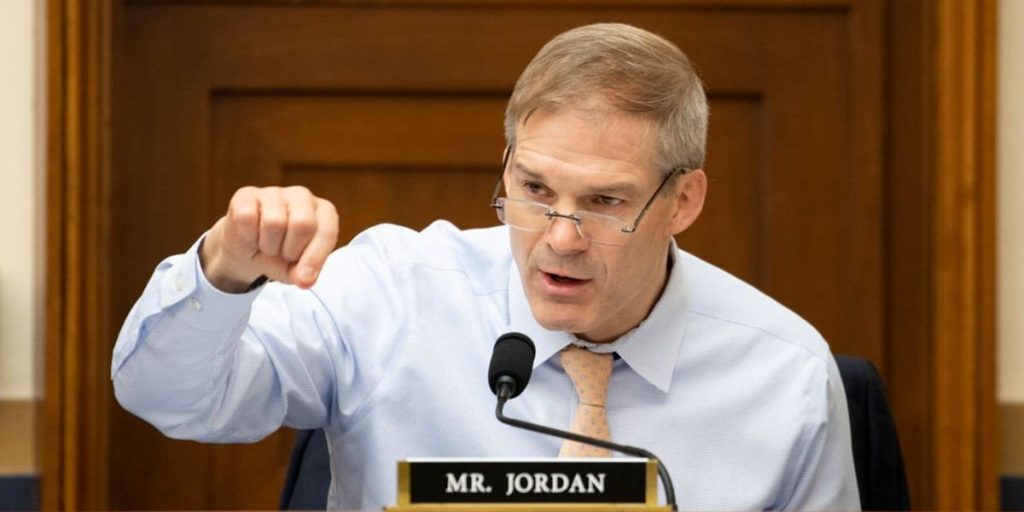The House Judiciary Committee has just dropped a bombshell, revealing that the IRS under President Biden leaked the personal information of over 405,000 Americans. This figure is a massive jump from the previously reported 70,000. The committee didn’t mince words, stating that this disclosure confirms suspicions about the leak’s true extent, which the Biden administration’s IRS tried to downplay.
Republican voices are loud and clear on this issue. Rep. Jim Jordan of Ohio, who is at the helm of the committee, highlighted this as a case of political maneuvering. He drew parallels with the past, pointing out that the Obama administration’s IRS had also targeted conservatives, implying a continued pattern of misuse.
Rep. Barry Moore of Alabama didn’t hold back either, calling out the administration for both allowing the leak and misleading the public about its magnitude. The issue here, he argued, isn’t just the leak itself but the false narrative spun around it. It’s another chapter in the saga of governmental corruption, he noted.
Meanwhile, Rep. Nick Langworthy of New York underscored the irony of the left’s uproar over Elon Musk’s actions while ignoring the IRS’s much larger breach. This reaction, he said, smacks of hypocrisy, given the scale of the IRS leak. Langworthy’s comments reflect a sentiment shared by many who see a double standard at play.
The uproar over the IRS leak has ignited a broader debate about privacy and government overreach. Many conservatives believe that this leak exemplifies a disregard for individual privacy and illustrates the dangers of big government. The Biden administration’s handling of this situation has only fueled these concerns.
Elon Musk’s involvement adds another layer to the discussion. His attempts to access data for tackling fraud have been met with criticism, yet the silence over the IRS’s actions is deafening. This dichotomy has not gone unnoticed by those who see it as indicative of biased media coverage.
The IRS leak has sparked calls for accountability and transparency. Republicans are pushing for answers, demanding to know how something of this magnitude could occur under the current administration. There’s a widespread call for the administration to come clean about what happened.
For many, this issue isn’t just about numbers; it’s about trust. Trust in the institutions meant to protect citizens’ information, and trust in the transparency of the government. The leak has shattered that trust for many Americans, raising questions about data security.
Critics argue that this incident is part of a larger pattern of governmental misuse of power. They see it as another example of the state overstepping its bounds, infringing on personal liberties. The debate over this issue is likely to continue as more details emerge.
The IRS has yet to provide a satisfactory explanation for the leak. There are calls for a thorough investigation to understand the full scope of what happened. Many are questioning whether this could have been prevented and what steps are being taken to ensure it doesn’t happen again.
The situation has put the Biden administration on the defensive. Critics are using this incident as a rallying cry to push back against what they see as an overreaching government. The demand for accountability is growing louder by the day.
This incident has also raised questions about the role of technology and data management in government. With so much information at their fingertips, the potential for misuse is high. This situation has highlighted the need for stricter controls and oversight.
Some conservatives are using this as a moment to advocate for smaller government. They argue that this leak is a direct consequence of an overly large and intrusive state. The call for reduced government intervention is gaining traction in light of these events.
The debate over privacy rights has taken on a new urgency. Many are concerned about how their data is being used and who has access to it. The IRS leak has brought these issues to the forefront, prompting calls for stronger privacy protections.
Amidst the backlash, there is a push for legislative changes. Some lawmakers are proposing new laws to prevent similar breaches in the future. The goal is to create a framework that ensures data security and holds those responsible for breaches accountable.
The IRS scandal is also likely to have political ramifications. As the story unfolds, it may influence public opinion and voter sentiment. The way this situation is handled could impact upcoming elections and the political landscape.
While the full impact of the leak is still unknown, it’s clear that it has struck a nerve. The public outcry is a testament to the importance of privacy and transparency. People are demanding answers and assurances that their information is safe.
As the investigation continues, Republicans are likely to keep pressing the issue. They see it as a clear example of governmental failure that needs to be addressed. The pressure is on for the administration to respond effectively.
The conversation around this incident isn’t going away anytime soon. It has opened up a broader dialogue about the role of government and the importance of protecting individual rights. The implications of this debate could be far-reaching.
With so much at stake, the scrutiny on the administration’s handling of this issue will be intense. The public is watching closely, and the demand for accountability is high. How this situation is resolved will be crucial in shaping the future of data privacy policy.
